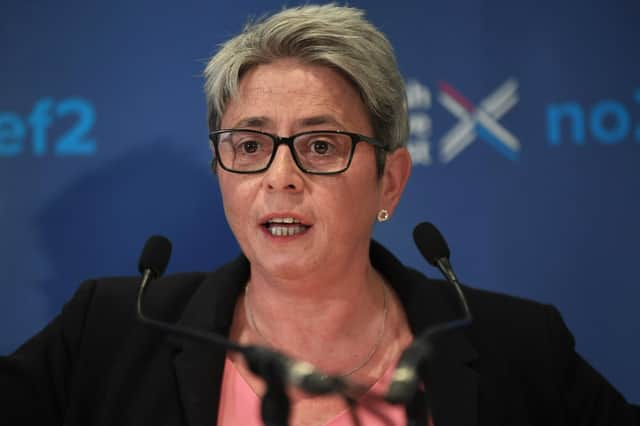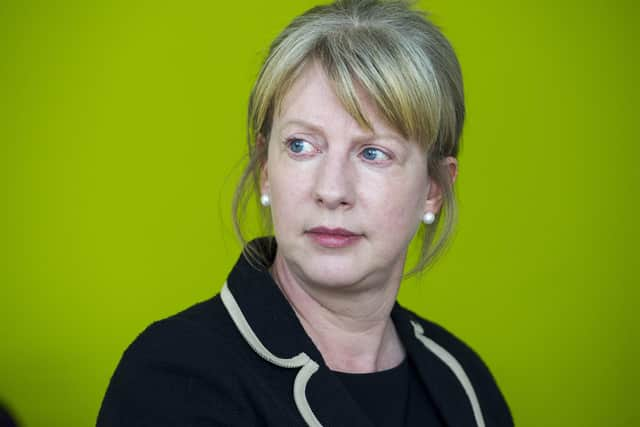Female MSPs on Twitter abuse: ‘They don’t realise there’s a person behind the politician’


The innocent decision, to which she had given little thought, proved to be a turning point in Ms Wells’ relationship with social media.
Within minutes, she had received a barrage of online abuse.
“You can imagine the kind of things people said,” Wells recalls. “Up until I was elected, I’d just used Twitter as a social thing, posting pictures of food or my pets and I’d not had any problems.”


Advertisement
Hide AdAdvertisement
Hide AdOne video posted in response to her photograph was so obscene that she immediately reported it to Twitter - and is still waiting for the platform to take action four years later.
With this year’s Holyrood election campaign set to be conducted almost entirely online due to covid restrictions, politicians are bracing themselves for a barrage of abuse in the run up to May.
Wells, along with former Labour leader Kezia Dugdale and SNP MSP Shona Robison, have warned that the abuse of female politicians on social media is deterring many women from standing as candidates in Scottish politics.
“I know so many amazing women who consider themselves deeply political and who are making incredible changes in their communities, who look at politics and think ‘why on earth would I step into that?’”, says Dugdale.


Politicians on all sides of the spectrum believe that social media should be better regulated by companies which run social media platforms such as Twitter, calling for accounts to be verified. Currently, accounts can easily be made anonymous, with abusive posts made without being able to be traced back to individuals.
“We need to stop anonymous unverified accounts online,” says Dugdale.
She references the default Twitter ‘egg’ picture that accompanies many anonymous accounts.
“How can an egg that doesn’t link back to a proper email account go online and just spend its day abusing people?” she says. “I don’t see any rational argument from Twitter and Facebook and the rest of the social media companies around about people having a right to anonymously abuse.
Advertisement
Hide AdAdvertisement
Hide Ad“It is not exclusively Twitter, but Twitter is a really good example of how people can instantly be put off expressing an opinion or view because of the nature of the beast that comes back. I think if measures were introduced [stopping accounts from being anonymous], you could take away some of the worst of that because people could have to put their names to what they say.”
She adds: “The problem is though, plenty of people are very happy to put their names to what they say. How do you change their behaviour? You have to convince people that it doesn’t work. There needs to be a concerted effort from political leaders and people who have a platform to just tone it down a bit – to make it clear that the public wants better than this.”
One of the biggest ever reports looking at public attitudes, set to be published tomorrow by Together, a coalition made up of groups including the NHS and the Scouts, and local organisations working in communities across the UK, will show that Scots want a more civil political debate overall. The poll questioned more than 160,000 people UK-wide and 5,000 north of the Border.
On a similar theme, Holyrood finance secretary Kate Forbes last week called for people to be “civil and kind” ahead of the May vote.
She said: “The beauty of democracy is you can express your views through a vote, you don't need to denigrate candidates online. Don't justify abuse, don't share abuse, respect democracy by letting it take its course. Ask questions, engage, and then vote. I respect all candidates for putting themselves forward for any election - and the least we can do in these crazy times is be civil and kind.”
Robison agrees that attitudes need to be changed, citing the “vicious, misogynistic abuse” suffered by politicians online. Political parties have tried to crack down on online trolls, however, many online activists are not formally linked to specific parties.
She says: “Women across all of the political parties get it. It is too easy at the moment for people to spout abuse without any repercussions and that is something that has to be tackled.
“We have all reported individuals until we’re blue in the face and occasionally things are taken down, but there is definitely a feeling that ‘that’s just what happens on Twitter’. There is an increasing pattern of nameless, faceless accounts which are just put up to spout abuse and vitriol.”
Advertisement
Hide AdAdvertisement
Hide AdRobison adds: “Debate and discussion is fine, but when you start calling names and using misogynist terms against women, the party should be very firm about it.”
Wells has learned not to engage with trolls, but says the online abuse has a negative effect on her family.
She says: “When it gets personal, it doesn’t just affect you, it affects your family and your staff members. They don’t realise there’s a person behind the politician.”
She references SNP MP Joanna Cherry, who received a barrage of abuse and threats after she was removed from her post as the party’s justice and home affairs spokeswoman at Westminster, having come in for criticism over her stance on transgender issues.
Wells says: “Joanna Cherry and I don’t agree on most things, but it is awful that way she has had to increase security on her home just because someone doesn’t share the same political views as her.”
She adds: “Our own research within the party showed that I was getting four times as much abuse online as Adam Tomkins [another Glasgow MSP]. I have been slagged off for my accent, for saying something people don’t agree with or for my appearance in the chamber. I put on a few pounds over lockdown, but that shouldn’t give people the right to call me fat. Twitter is an awful place.”
However, it is not exclusively female politicians who receive abuse online.
A documentary broadcast earlier this week about former Liberal Democrat leader Charles Kennedy told of the online abuse he had endured - as well as anonymous, “aggressive” notes left on his car and put through his letterbox. Kennedy died aged 55, five years ago of complications relating to his alcoholism.
Advertisement
Hide AdAdvertisement
Hide AdSpeaking on the BBC Alba documentary Charles Kennedy: A Good Man Speaking, Brian Wilson, a journalist and former Labour MP, told how the politician employed a member of staff full time to delete the abuse which targeted him on social media.
Fellow Liberal Democrat Alex Cole-Hamilton was approached out of the blue by Police Scotland two years ago after they had monitored his online accounts.
“They came to me and said they were concerned about things that were being said and gave me a personal attack alarm,” he says.
“Scottish politics right now is a sewer. It’s vicious, it’s a blood sport and it’s not confined to one side.”
However, some trolling within Scottish politics does not come from within the country.
This week, it emerged that Twitter has banned accounts linked to the governments of Russia and Iran which were found to have amplified messages from pro-independence critics of First Minister Nicola Sturgeon. Around two dozen accounts linked to Scottish messaging are believed to have been removed as part of a crackdown by the platform.
A spokeswoman for Twitter points to recent updates to its policies which aim to curb abuse, including prompting individuals when they are about to post potentially hateful content.
She says: “Twitter is deeply committed to keeping people safe online, and to advancing the principles of the open internet. We support regulation that is forward thinking, understanding that a one-size-fits all approach fails to consider the diversity of our online environment.
Advertisement
Hide AdAdvertisement
Hide Ad“We will continue to collaborate with the government and industry to build on the work we’ve already undertaken to make the internet a safe environment for all.”